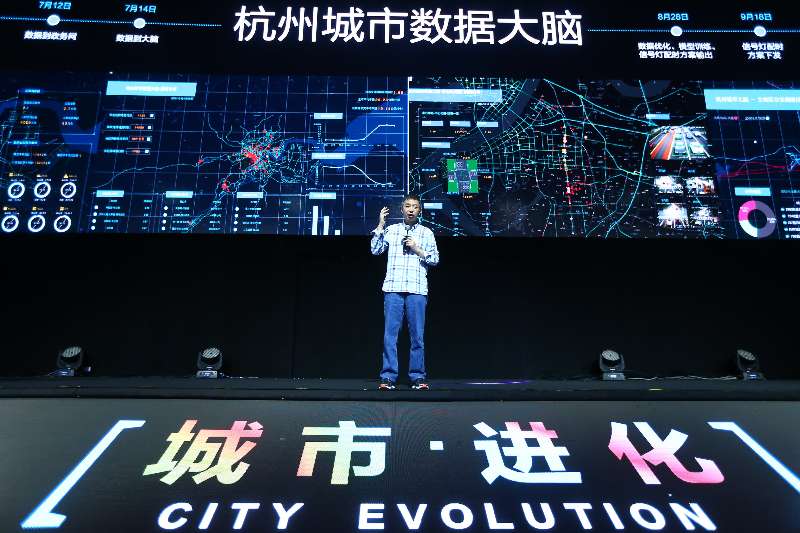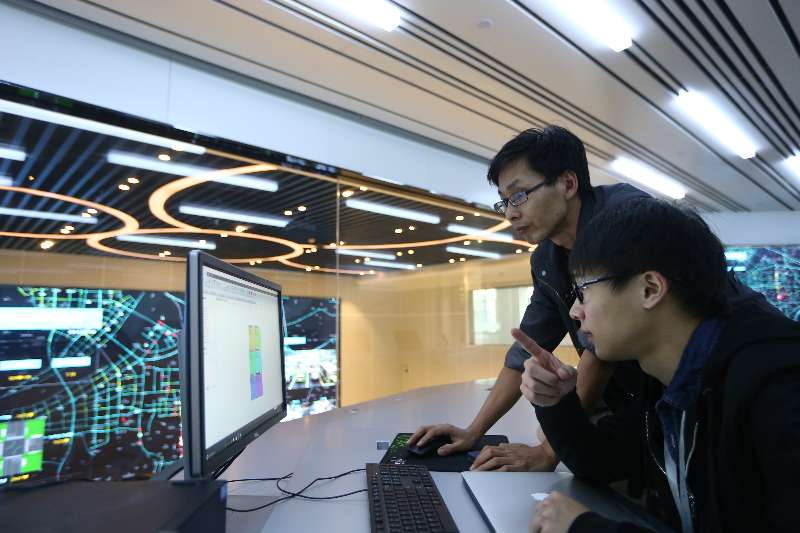ã€Global Science and Technology Report】 "Any city's video cameras generate at least 1 million days of video every day, but these data have never been used as resources." Wang Jian, who first proposed the city's brains, once again in Shenzhen. Call for data to become the most important resource for urban governance.
On April 9th, Wang Jian, Chairman of the Technical Committee of Alibaba Group, was invited to share the practice and thoughts on the urban brain project at the next generation information technology industry development summit jointly organized by the Ministry of Industry and Information Technology and Shenzhen Municipal People's Government. The forum was held during the 5th Electronic Information Expo.
"We have called for smart cities for so many years and suddenly discovered that there is no brain and wisdom cannot be discussed." Wang Jian introduced the origins of the city's brain. "A city with a data brain can truly become a sustainable city."

In April 2016, Wang Jian took the lead in 13 local companies and jointly initiated the urban brain project with the Hangzhou Municipal Government. It was officially released at the Yunqi Conference in October last year. The goal of the city's brain is to use data resources to help city decision-making, conduct global real-time analysis of the entire city, automatically allocate public resources, and ultimately turn data into the most important resource for urban governance. Resolving traffic congestion has become the first challenge for the city’s brain to meet.
In September last year, after the urban brain traffic module was put into trials in Hangzhou Xinlu, the traffic speed of the section increased by an average of 3% to 5%, and in some sections, it increased by 11%. At present, there are more than 50,000 traffic cameras in Hangzhou that connect to the brains of cities. In March this year, Suzhou also joined the ranks of urban brains.
With the rapid development of the Internet in China, the richness of urban data far exceeds that of Western countries. This is where Wang Jian’s confidence in exploring the city’s brains in China lies. “People in China use mobile phones to buy roasted sweet potatoes, and Americans still use cheques to pay utility bills. It is conceivable how much the Chinese people have confidence in the Internet infrastructure and how rich the data are.

Wang Jian also stressed that China’s urban development is facing unprecedented challenges today, and no experience can be used for reference. This requires us to solve our own problems. “The urban brain is an important exploration of China for the world. It will become an important urban infrastructure, just like the power grid; and the data will become the most important resource for urban governance, exceeding land.â€
The following is the full text of Wang Jian's speech
In the past few years, we have talked about cloud computing, big data, and the Internet of Things. We also include today’s bloody artificial intelligence, and there are also many puzzles. One very important question is what has changed in this world. What kind of world are we facing? From a small town to a few thousand people, to a city with tens of millions of people, what kind of changes is the Internet giving to people and cities? One change that I think is very important is that the Internet has become an infrastructure that has penetrated more than any infrastructure in the history of mankind. The infrastructure like electricity and water has penetrated into the past.
In the past, human production and activities depend on the resources provided by nature for oil, coal, and land. The data generated by human activities today is becoming a very important natural resource for human beings. It may be that everyone does not realize that the data precipitated by a city today far exceeds everyone's imagination. As an example, I recently read a material that a video camera from an ordinary city in China must produce at least one million days of video every day. This huge amount of data, but no one realizes that this data can be used as Resources to solve the many challenges we face today, including transportation issues, quality of life issues, and urban development issues. This reminds us of the development of a city today. In addition to power grids, water, tunnels, and subways, does it need a special thing that is the brain of the city?
Every city needs the city's brain. This implies three things. First, every city needs to treat the data accumulated and precipitated by the city as a very important natural resource, just as important as land resources and water resources.
Second, the thinking and operation of the city’s brain needs mechanisms to use valuable data to change and serve the city and make the city better. Just as there is no national grid, electricity cannot reach every family, and people can't be used everywhere, everywhere and all the time. Today our traffic camera may be fined, but it does not optimize urban traffic, so we need a mechanism to allow data to flow to solve practical problems. I said that the furthest distance in the world is not from the South Pole to the North Pole, but a camera on a pole with no flow between them.
Third, the city's brain is a very important "standard" for the city. It is an important exploration. Every city should have it, but it will take a long time for the city's brain to be identified as the "standard" of the city. Just like everyone agrees. Just as a city needs to build a grid, it has also gone through a long period of time.
The city brain is very meaningful, because it can bring great changes to the city management of urban governance, such as traffic, if we integrate all dimensions of data, such as traffic video surveillance, such as vehicle trajectories, such as peak hours, off-peak hours The traffic light data, etc., are used to manage traffic and optimizing traffic lights may reduce urban congestion.
If we allow these data to flow, it will be possible to change people’s lives. In fact, the most precious resource for each of us is time resources. Many things can be changed, but time resources cannot be changed. If we let the city data flow, when the people need to line up and need to go through the queues several times to do things, one queue will be able to do a good job so that the common people can get benefits. Zhejiang tells the people to do one thing as long as one time, so that the data run more people to run less, this is a huge resource optimization.
Why do I say that the urban brain project is that China is exploring the world, because today there are no people in the world and no city has built the city brain as an important part of urban construction. Just as Europeans invented electricity, Edison first turned electricity into infrastructure in the United States. Today we need to use projects like the city's brain to promote, use the city's data resources to better manage and govern the city, and turn the city's brain into the infrastructure of every city. This is actually a huge challenge, because not only is there a technical challenge, but also a legal challenge, etc. China has made such an attempt and promotion that it can explore the world.
Why do you say that China has the conditions to do this exploration?
The first reason is that the use of the Internet by the Chinese people is very special and popular and leads the rest of the world. Juggling said that today's Chinese people are holding mobile phones to buy baked sweet potatoes on the ground, but in the United States, ordinary people still pay checks to pay utility bills. What is the difference between this example or what does it mean? It means that people who use mobile phones to buy roasted sweet potatoes have great confidence in the Internet infrastructure. We can imagine how many people's activities in such Chinese cities precipitated data. This is because U.S. dollars that use cheques to pay utility bills do not. Because of the development of Internet technology in these past decades, China has more data resources than any other country in the world.
Second, China is facing far more problems and challenges than others. When I chatted with a traffic expert, he said that China’s road complexity is much larger than that of any country because the intersection of China is not a four-way intersection but a “twelve intersection†because of road cars, people, bicycles, Livestock and so on. The situation of China's transportation is very complicated and the challenges are very large. We cannot expect others to pay us for this tuition, to explore, and then let us enjoy the results of their exploration.
In the end, I would like to emphasize two points. First, when we talked about big data for so many years, we all regard data as IT rather than resources. What the government should establish is not the Bureau of Big Data, but the Bureau of Data Resources, paying attention to the importance of land resources to data resources.
The second is that we have talked about smart cities in the past for so many years. However, in cities where there is no brain, wisdom cannot be discussed. A city with a data brain can truly become a sustainable city.
There are many things happening in China today. It is worthwhile for China to do such an exploration for the world. The tuition we pay will help the other cities of the world to become smarter and better.
Micro COB LED Display,Micro COB LED sign display,COB LED display video wall,Small Pitch COB LED signage,Mini COB LED display Panel,Fine pixel pitch Micro COB LED screen
Shenzhen Xinfei Century Technology Co., Ltd. , https://www.rgbdancing.com